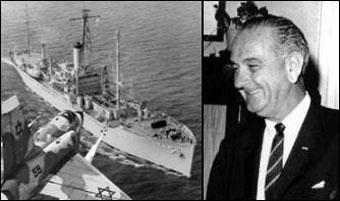 “In a historical context, the American emergency airlift to Israel in 1973, the constant diplomatic support, the economic and military assistance can all be credited to the seeds planted by LBJ.”
“In a historical context, the American emergency airlift to Israel in 1973, the constant diplomatic support, the economic and military assistance can all be credited to the seeds planted by LBJ.”
By Lenny Ben-David
A few weeks ago, the Associated Press reported that newly released tapes from US president Lyndon Johnson’s White House office showed LBJ’s “personal and often emotional connection to Israel.” The news agency pointed out that during the Johnson presidency (1963-1969), “the United States became Israel’s chief diplomatic ally and primary arms supplier.”
But the news report does little to reveal the full historical extent of Johnson’s actions on behalf of the Jewish people and the State of Israel. Most students of the Arab-Israeli conflict can identify Johnson as the president during the 1967 war. But few know about LBJ’s actions to rescue hundreds of endangered Jews during the Holocaust – actions that could have thrown him out of Congress and into jail. Indeed, the title of “Righteous Gentile” is certainly appropriate in the case of the Texan, whose centennial year is being commemorated this year.
Appropriately enough, the annual Jerusalem Conference announced this week that it will honor Johnson in February 2009.
Historians have revealed that Johnson, while serving as a young congressman in 1938 and 1939, arranged for visas to be supplied to Jews in Warsaw, and oversaw the apparently illegal immigration of hundreds of Jews through the port of Galveston, Texas.
A key resource for uncovering LBJ’s pro-Jewish activity is the unpublished 1989 doctoral thesis by University of Texas student Louis Gomolak, “Prologue: LBJ’s Foreign Affairs Background, 1908-1948.” Johnson’s activities were confirmed by other historians in interviews with his wife, family members and political associates.
Research into Johnson’s personal history indicates that he inherited his concern for the Jewish people from his family. His aunt Jessie Johnson Hatcher, a major influence on LBJ, was a member of the Zionist Organization of America. According to Gomolak, Aunt Jessie had nurtured LBJ’s commitment to befriending Jews for 50 years. As a young boy, Lyndon watched his politically active grandfather “Big Sam” and father “Little Sam” seek clemency for Leo Frank, the Jewish victim of a blood libel in Atlanta. Frank was lynched by a mob in 1915, and the Ku Klux Klan in Texas threatened to kill the Johnsons. The Johnsons later told friends that Lyndon’s family hid in their cellar while his father and uncles stood guard with shotguns on their porch in case of KKK attacks. Johnson’s speechwriter later stated, “Johnson often cited Leo Frank’s lynching as the source of his opposition to both anti-Semitism and isolationism.” (…Full Article)



